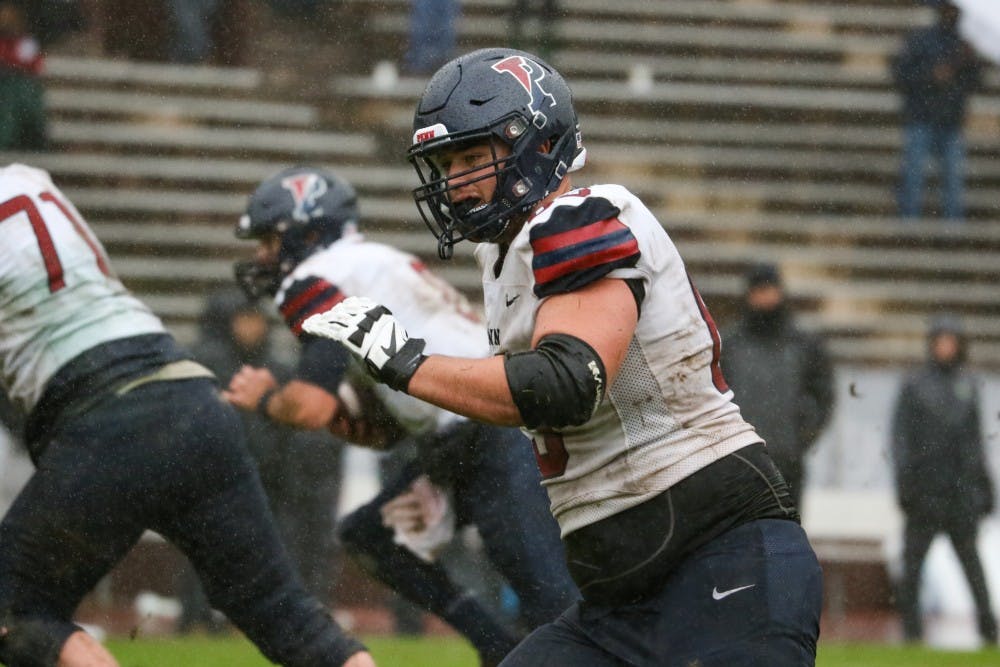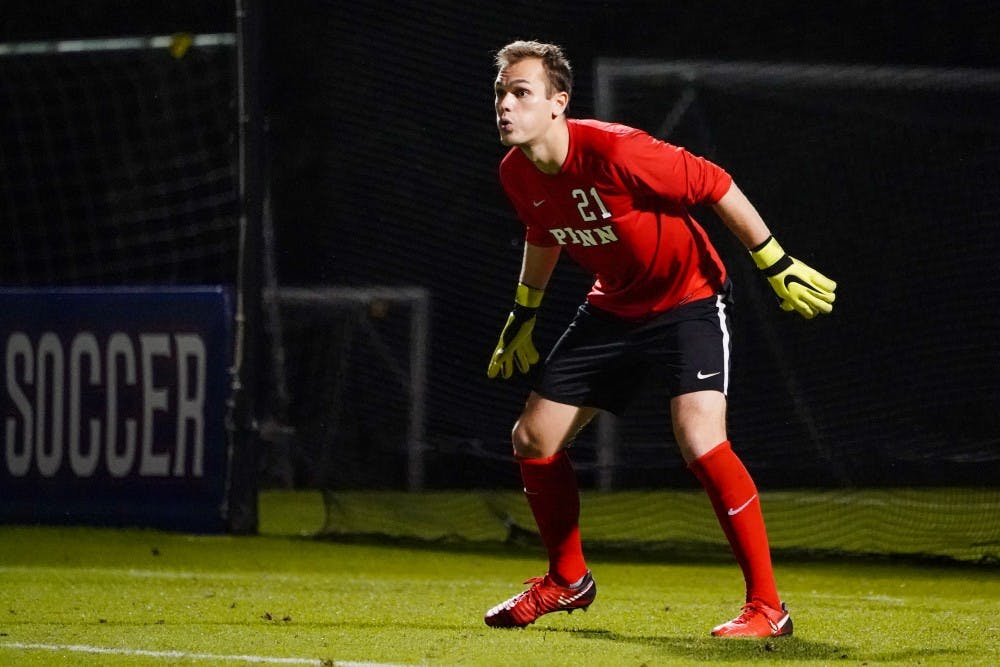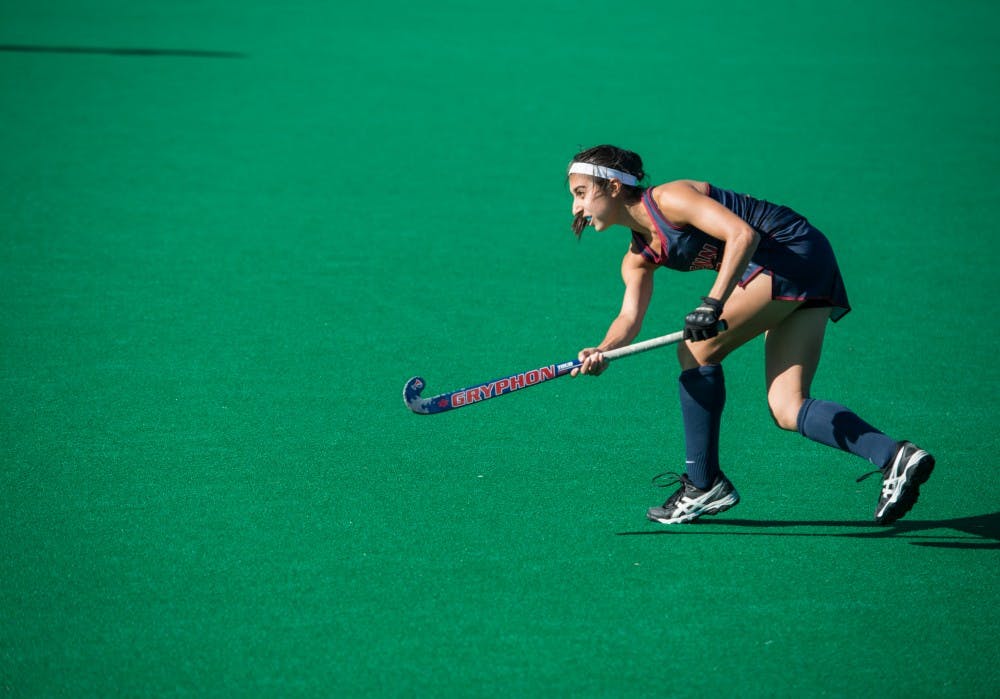
Penn football's Tommy Dennis is just one of many seniors who find themselves with a lot more free time after their fall sports end.
Credit: Alec DrugganSpring has sprung and fall sports have faded, especially for some graduating seniors.
While Ivy athletes train all year round, a fraction of them compete only in the fall, rather than the winter or spring. For those sports, summer preseasons are time to prepare immediately before the season begins and the spring offseason is a time to improve over a longer period of time.
Sports that have their competitive seasons in the first semester of school include football, soccer, field hockey, sprint football, and volleyball. Once their season is finished, they could have as much as a full nine months before their next competition.
But for seniors, their final action occurs a semester before graduation. This means that they may have an entire spring semester as a non-athlete. Since they no longer have competition to prepare for, their collegiate athletic careers end in the fall.
With the lack of athletic responsibilities comes a plethora of free time. In-season athletes spend up to 20 hours per week of “countable activities,” which include practices, lifts, and competitions. Out-of-season athletes may spend up to six.
Countable activities, however, do not include walking to the practice fields, dressing in team gear, bussing or flying to competitions, team meals, or other necessary time commitments that come with being a student athlete.
In the spring, some fall athletes have really used their open schedule to pursue activities that weren’t possible with a demanding athletic schedule.
Tommy Dennis - Football
Tommy Dennis is a rare example of a second-semester fall sport senior who is still pursuing his sport with great effort. Following a decorated career with Penn football, he is still hungry for competition at the next level — the National Football League. Even so, Dennis has found the spring semester to be beneficial.
Rather than waking up at 5:00 a.m. for spring ball practice, Dennis is able to sleep in before going to a morning class.
“I definitely have a lot more free time and I don’t have to wake up as early, which is so nice," Dennis said. “Seeing the guys go down to spring ball is both funny and I feel bad for them. I have one of my roommates still playing so I make sure to make fun of him when he has to get up early.”
Not having to wake up at the crack of dawn means that Dennis has the freedom to work out on his own time, balancing training and classwork on a more flexible schedule.
“I’ve been training a lot, running, lifting, stuff like that, playing a lot more basketball, which is fun, and trying to catch up in classes. It’s nice to not always have to be so stressed out between classes and football.”
While not missing the early wake-up alarm, Dennis does miss other aspects of having the football commitments. Not following the team schedule means he misses the locker room camaraderie and hanging out with his teammates.
“I do miss the locker room experience and the hanging out with all the guys and stuff, that’s definitely the worst part about not playing anymore,” he said.
Football will still be a large part of Dennis’s life in the foreseeable future. This past December, Dennis played in the FCS bowl before following up with the Tropical Bowl in January.
“It’s kind of weird coming from a smaller school," he said. “People don’t look at Penn and think 'NFL players' so that’s definitely hard. You get judged differently than a guy who goes to Alabama. [In the Tropical Bowl] I got to play with a bunch of really cool kids, kids from like Pitt, Florida State, like really big time schools so I could show that I could do well against other people who were from bigger-time schools.”
Even though his Penn athletic career is over, Dennis still plans on being involved in the program.
“It’s been such a big part of my life," he said. “I’ll definitely come back and watch and support the guys, because for three years I’ll still have good friends on the team, so the next couple years will be fun to watch for sure.”

Senior Scott Forbes
Scott Forbes - Soccer
In-season, a student-athlete might be more athlete than student. Senior goalkeeper Scott Forbes finished his final season with the 15th best save percentage in Division I. This semester, however, he has switched gears toward focusing on his future outside the sport.
Much of the spare time Forbes had since the soccer season ended has been spent studying for Level I of the Chartered Financial Analyst examination. The CFA is an assessment of ethics and professional standards, investment tools, asset classes, portfolio management, and wealth planning.
Forbes could be found spending hours in the Van Pelt library stacks studying for the six-hour test. In June, he will take the Level II CFA exam, another six-hour endeavor. Having the spring semester and the extra time to study will surely help Forbes to improve his score in a less stressful manner than if he were still constrained by his athletic schedule.
On top of the CFA pursuit, Forbes has been able to focus more on his Penn studies. Some of the small accessibilities that non-athletes may take for granted are now a luxury for the new soccer alumnus.
“It’s nice having a lot of free time to pursue what you want to do and take advantage of the resources that the school provides that the athletes can’t really take advantage of for a lot of it … office hours is the biggest one,” Forbes said. “A lot of times office hours fell into practice time, so now it’s nice if I have any questions just being able to go into office hours and have them answered.”
“I still train with the team," he added. “They only have one keeper now so [senior Etan Mabourakh] and I help the team whenever we go back. Being able to have two keepers, we think, makes a more productive training session, so we’re happy to do that for the team.”
“With the program, I’ll obviously still follow it," Forbes said. “It’s something that I’ve been very connected to for four years of my life now. Soccer is such an easy sport to play anywhere in the country, so it’s definitely something I want to pursue after graduation.”

Senior Karen Seid (File Photo)
Karen Seid - Field Hockey
Penn offers a multitude of extracurriculars, but many times Penn’s athletes cannot pursue their non-athletic passions because of their schedules. Karen Seid is taking advantage of her semester off to do an activity she has been passionate about her whole life — the flute.
“It’s definitely a transition from being a full-time Division I athlete to being a retired athlete and now you have so much more free time … [without] commitment with practice schedules, time for lifting, and arriving to practice early which takes up so much of your actual day,” Seid said. “The biggest transition for me has been figuring out what to do now with all this free time.”
Like Forbes, Seid is also enjoying the benefits that Penn offers in her newfound spare time.
“Now you can take advantage of a lot of the aspects and opportunities that Penn has to offer that you really didn’t have time to experiment and try, so either socially spending time with people you haven’t had a chance prior, and also just joining new groups and figuring out for yourself independently where you see yourself growing in new directions," she said.
For Seid, growing in a new direction means returning to her old passion for music. In high school, she was a part of the band, jazz band, and orchestra, and Seid joined the Penn Wind Ensemble as a freshman intending on continuing her musical hobby.
However, between the time commitment of field hockey and her studies, she had to quit. Now, with only her studies to focus on, Seid has been able to rejoin the club. However, there are downsides to having all the extra time.
“I really miss having that time to workout alongside your best friends, your teammates, in a structured time, or going to breakfast or brunch after morning practice, or going on those away trips and being on the bus together," she said.
Although these three athletes may be finished with their athletic careers, they still have to finish out their last semester of studies to graduate — just like everyone else.
The Daily Pennsylvanian is an independent, student-run newspaper. Please consider making a donation to support the coverage that shapes the University. Your generosity ensures a future of strong journalism at Penn.
Donate







